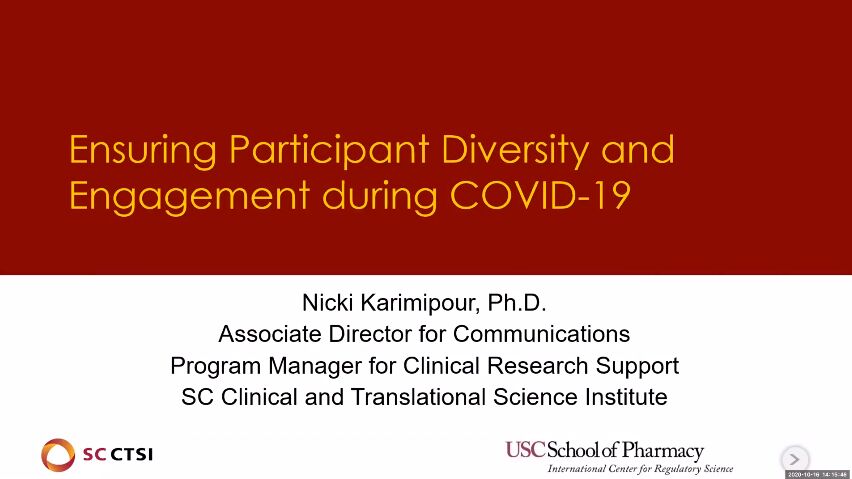1. What will be covered
a. Current Issues in Clinical Trial (CT) recruitment
b. Importance of diversity in CT recruitment
c. Barriers Associated with clinical research access
d. Strategies for engaging minority populations
e. Influence of COVID19
f. Engagement strategies
g. Example
h. Takeaways for researchers
i. CTSI resources
2. Current Issues in CT recruitment
a. Normal circumstances: recruitment is slow and tedious
b. Not meeting recruitment goals leads to needing more money and risk of site’s discontinuation of funding
c. Most studies are not diverse enough (socioeconomic, race, ethnicity, gender)
d. More inclusive enrollment leads to more knowledge on drug metabolism and disease itself
e. Lack of inclusivity, efficiency, proper engagement, follow-up and return of results and focused approach
i. No result follow-up factors into distrust from patient
3. Importance of Diversity
a. Health disparities exist which influence people’s availability to care and quality of care
b. Population is diverse and research needs to reflect that
4. Excerpt from article in The Atlantic: Why are health studies so White?
a. Showcases a Black patient needing asthma medication but only 5% of known genetic information relating to asthma apply to those who are Black
b. Research has shown non-white populations are not less willing to participate, they are just approached less
i. We should not cherry-pick who we think will participate, who has insurance, etc.
5. What prevents CT participation?
a. Barriers can be related to socioeconomic, geographic, psychosocial, lack of knowledge regarding medical research
6. Strategies for engaging minority populations in research
a. Research shows minority populations are just as willing, but there is mistrust present (what happens to my privacy, to my sample? etc.) If patients’ questions are answered, they tend to feel more comfortable
b. Continue to approach ALL kinds of people
c. Ask participants about barriers which prevent them in partaking in research (i.e. transportation issues? Alternative types of payment preferred?) Try to accommodate them!
d. Ask participants how to make participation easier (i.e. childcare? Food provided during lunchtime?)
e. Ask participation what they are comfortable with! (i.e. preferred communication modes)
7. How to ensure greater diversity
a. Need proper foundational research to understand and learn about focus population (i.e. town halls, focus groups)
b. Integrate this information into approach
c. Record information obtained from focus groups – will be useful in staff turnover
8. How does COVID influence this?
a. People are distracted
b. Increase in mental health, child abuse and domestic violence, work time has either increased or shifted to home-based
c. Increase in financial concerns
d. Many may not want to come in-person due to safety concerns
e. Crucial to ask participants what they are comfortable with regarding research participations
9. Examples
a. Focus on using community engagement to deliver information to those hit the hardest by COVID-19
10. Takeaways
a. Important to think critically of patient circumstance – be accommodating and flexible
b. Ask target audience what their needs are and incorporate those accordingly
c. Provide masks, sanitation for participants, enforce social distancing
11. CTSI resources
a. Recruitment Guide
b. Community Engagement Group
c. Clinical Studies Website showcasing current trials
12. Thank you!
13. Questions
a. Do you automatically generate materials in Spanish or is this upon request? What other languages do you provide materials in (at CTSI)? We nearly always translate into Spanish due to large LatinX population, and we have received recent requests for Cantonese, Mandarin, and Korean translations. Aside from that, we wait for a request to translate.
Regulatory Science Symposium: Diversity in Clinical Trials in the Time of COVID-19 Session 7: Ensuring Participant Diversity and Engagement During COVID-19
Research & Study Design
Regulatory & Quality Sciences
Nicki K. Apaydin, PhD
Associate Director of Communications
Course Syllabus/Topics
Acknowledgement
Accompanying text created by Annie Ly | Graduate Student, Regulatory Science, USC School of Pharmacy lyannie@usc.edu

